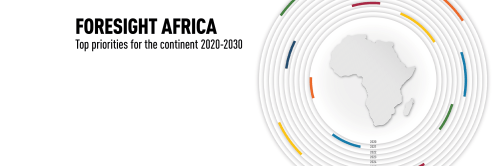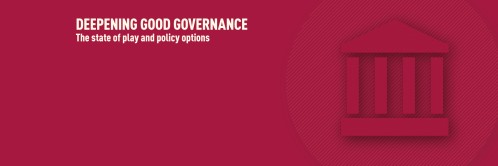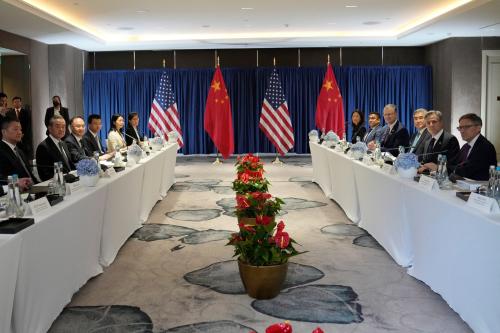Below is a Viewpoint from Chapter 2 of the Foresight Africa 2020 report, which explores six overarching themes that provide opportunities for Africa to overcome its obstacles and spur inclusive growth. Read the full chapter on deepening good governance.
Imminent changes in climate, demography, and urbanization will reshape Africa’s security landscape by the middle of this century. By 2050, parts of the African continent will be much hotter and arid, while others will be prone to flooding and rising sea levels. One in four people on the planet will be African, the continent’s demographic structure will still have a stubbornly broad base with a high dependency ratio, and new entrants into the job market will find it difficult to find employment. The majority of Africans will be living in cities and, notably, the number of urban dwellers living in slums is expected to double.
Consequently, security outcomes across the continent will be impacted in various ways. First, these future trends will be collectively reinforcing. Climate trends will influence migration, and urbanization will be driven by population dynamics. Thus, unraveling interlinkages will become even more important than searching for “root causes” of insecurity. Second, the impacts of these trends will vary over time and space. Clearly, broad initiatives and linear solutions will be unhelpful. Instead, granular, location-specific programs (national, subnational, and community) will become even more necessary. Third, these trends will affect different types of insecurity differently (see Table 2.1).
Future challenges in Africa’s security sector are daunting, but not insurmountable.
The inexorable evolution of Africa’s security landscape will clearly change the nature, incidence, and location of violent conflict across Africa. For example, the combined effect of growing population pressures and desertification in the Sahel will heighten land and resource tensions in already fragile communities, making them more susceptible to militia violence and violent extremism. On the other hand, megacities (like Lagos, Cairo, and Johannesburg) with expanding slums are likely to experience an increase in violent protests that could be either social, political, or both.
The diverse pathways and potential impacts of this evolution could inform the design and implementation of relevant policies, as well as the establishment of resilient institutions. More than ever before, the policy response will need to go beyond reacting to the symptoms and instead focus on the drivers and sustainers that reinforce persistent conflict.
Policymakers also face the added challenge of untangling the complicated, and often transnational, milieu of future trends. Furthermore, the almost binary core vs. periphery approach to politics, economics, and insecurity will be a thing of the past, as urban areas become the epicenter and climate variability becomes an even more important determinant of where Africans live, how they earn their livelihoods, and the degree to which groups peacefully coexist.
Addressing the complexities of Africa’s emerging security landscape requires careful consideration of the following:
- Build capable institutions. This does not imply training and equipping existing security institutions to address today’s problems more efficiently. Instead, it requires targeted investments and strategic partnerships to resolve the multidimensional challenges of tomorrow. Also, capacity-building initiatives in Africa’s security sector must be matched by efforts to improve institutional capability and diminish politicization.
- Leverage technology. This must go beyond broad conversations about mobile phone ownership and internet access. It should explore ways in which technology (particularly infotech, biotech, and fintech) could address some of the enduring structural challenges that lie at the heart of Africa’s emerging and dynamic security landscape.
- Strengthen state-society relationships. Repairing and redefining the social contract between governments and the governed in Africa must be prioritized. Perversions of the social contract, including pseudo-democracy, account for the upsurge of governance-related violence in recent decades. Ensuring critical investments, developing effective partnerships, and countering endemic corruption are essential in this regard.
- Enhance domestic resource mobilization. True ownership and effective accountability are only possible if African countries reduce their dependence on external assistance, in all its forms. Central to this goal is the sound governance of the continent’s abundant natural resources in order to maximize fiscal benefits. Governments would then be in a better position to invest, strategically, in activities and institutions that address the drivers and sustainers of insecurity. External partners, for their part, would find it easier to align their assistance with programs and activities that are truly country owned.
Future challenges in Africa’s security sector are daunting, but not insurmountable. Resolving them is central to the attainment of socioeconomic development goals like the 2030 SDGs and the African Union’s Agenda 2063. This must start with tangible, collective, and concerted efforts to address the continent’s persistent market, governance, and institutional failures.








Commentary
Unpacking the implications of future trends for security in Africa
February 3, 2020